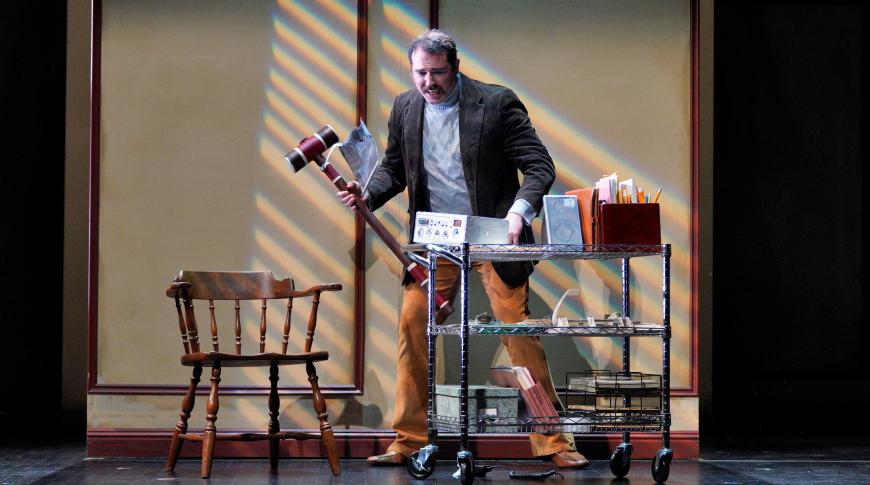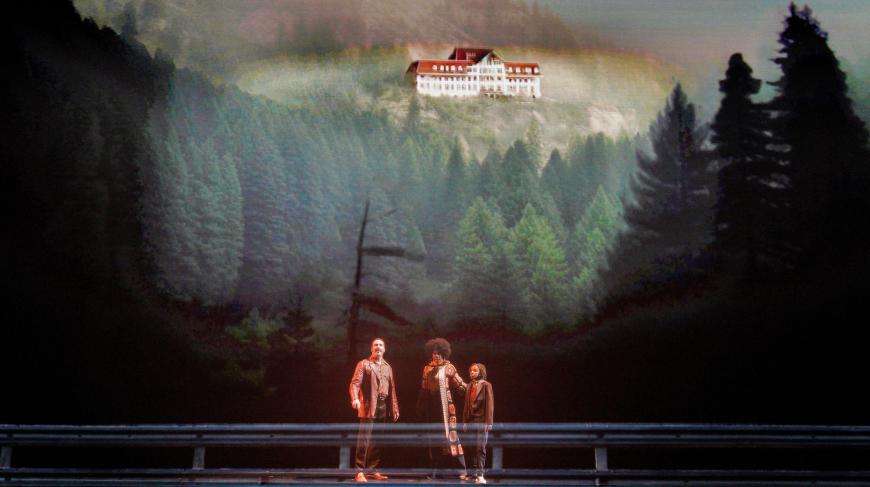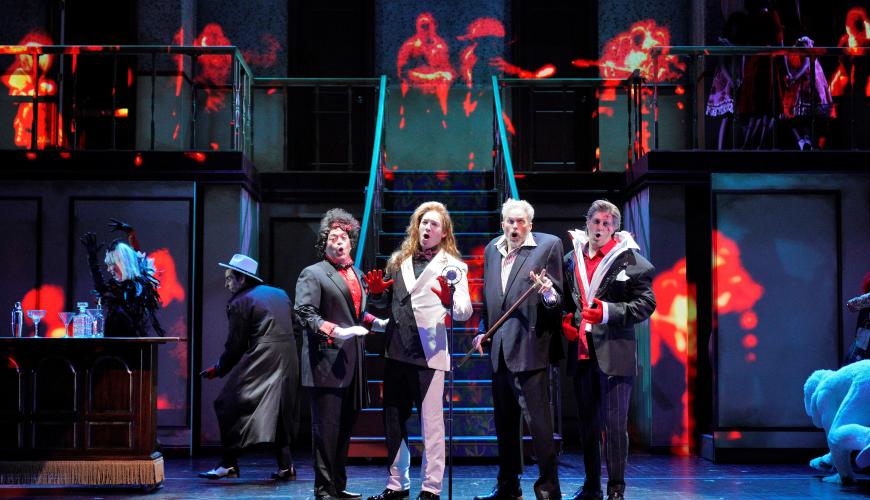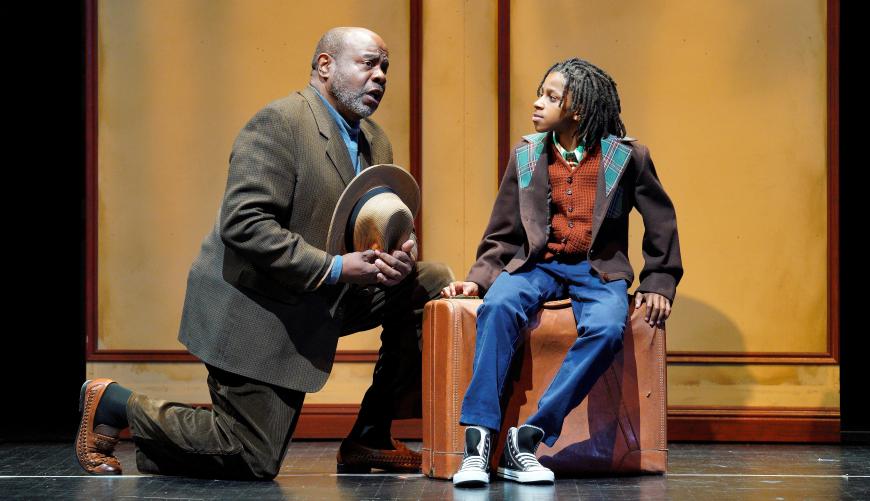
In the epilogue of composer Paul Moravec and librettist Mark Campbell’s 2016 adaptation of Stephen King’s horror novel The Shining, Wendy Torrance, having survived her husband Jack’s attacks on her and their son, as well as the destruction of the Overlook Hotel, walks onstage to a serene lakeside setting. In Opera Parallèle’s West Coast premiere of the work, she’s carrying a book, which she sits down to read. Elsewhere, son Danny and friend Dick Hallorann are fishing on the lake.
The book she’s carrying is an omnibus volume containing King’s Carrie, ‘Salem’s Lot, and yes, The Shining, an Easter egg that elicited giggles from the few audience members who noticed at the Friday, June 2 performance. It’s a nice touch at the end of a high-tension opera that’s all about Jack’s disintegration.
Jack is a troubled man from an abusive family. He has accepted a job as the winter caretaker at the Overlook so that he can resume a once-promising writing career, recover from alcoholism, and get a fresh start after certain events at the private school where he taught. Instead, spirits from the past lingering at the Overlook sense his vulnerabilities and work to drive him mad, hoping he’ll murder 5-year-old Danny so that they can steal Danny’s psychic abilities.

In adapting The Shining, Moravec and Campbell rightly ignored Stanley Kubrick’s famous 1980 film, which misrepresented the novel. They view Jack not as the monster Kubrick and Jack Nicholson made him but as a man from an abusive family who is trying to be a decent husband and father. The opera also wisely passes on the more lurid episodes in the book, such as Room 217’s corpse in the bathtub, focusing instead on the human elements of the plot. For this production, the composer provided a revised orchestration for a still-colorful 22-piece orchestra, a move that will make The Shining feasible for smaller-budget opera companies to stage.
Campbell’s libretto is compact, swift-moving, and expertly constructed, starting when the Torrances arrive, full of hope, at the hotel. The libretto occasionally alludes to the events that brought them to the Overlook, communicating the information you need to understand Jack’s behavior and Wendy’s fears. The text is gracefully written and singable. Add in Moravec’s sympathetic settings and the excellence of the singers, and you could understand nearly every word Friday without the supertitles.
Opera Parallèle’s presentation is a co-production with Hawaii Opera Theatre and Portland Opera, and it neatly solves the problem of turning the Overlook Hotel itself into a character. The boiler, which we are repeatedly told needs to be coddled to keep it under control, is a three-dimensional model that constantly hisses steam. Projections of the Overlook’s plumbing seethe as if the pipes are inhabited by insects.

When the lighting turns red, the spirits are haunting Jack — or he’s hallucinating them. It’s not an accident that Jack’s sweaters prominently feature red, too. Alina Bokovikova’s sleek costumes and Jim French’s lighting design unify the physical production and reinforce the surreal nature of the plot. Wendy’s Afro and outfits place the work squarely in the 1970s.
Jacquelyn Scott’s clever stage designs are brilliantly suited to the needs of smaller opera companies. Each element, from a bed to the central staircase, is on wheels and moved around by the costumed performers in the many small roles. That staircase also conceals the pantry where Wendy locks Jack when he’s trying to murder her and Danny.
Moravec’s colorful music carefully delineates each setting and character. When the Torrances are en route to the Overlook, you hear a hint of the grandeur of the Fifth Door from Béla Bartók’s Bluebeard’s Castle, and when they arrive, perhaps a touch of Bernard Herrmann’s score for Alfred Hitchcock’s Psycho. Moravec writes great ensembles, from a brief trio on the text “All will be fine” to the big party scene in Act 2, where Jack, pursued by the mocking spirits, has decisively gone mad.
For Jack, here strongly sung and acted by baritone Robert Wesley Mason, Moravec provides music that becomes more jagged and discordant over the course of the opera, as Jack’s state of mind goes from hopeful to deranged. Kearstin Piper Brown’s gorgeous, vibrant soprano beautifully suited Wendy’s sweet and soaring lines.

The warm-voiced and avuncular bass-baritone Kevin Deas was an ideal Dick Hallorann, the psychic Black cook who befriends Danny after noticing the boy’s abilities. Tenzin Forder was vivid in the non-singing role of Danny, by turns vulnerable, haunted, and brave. Danny not only doesn’t sing, he doesn’t have many words to speak, yet Forder’s superb physical acting skills put across his state of mind brilliantly.
Brian Staufenbiel’s direction is generally on the mark through the swiftly shifting moods of The Shining. He’s particularly good in showing the interactions of the Torrances, though exhibiting more of the physical tics Jack has in the book would have strengthened the character’s underlying instability. Nicole Paiement conducted with her typical precision and attention to the dramatic flow of the work.
The Shining is a real crowd-pleaser of an opera; human, dramatic, mysterious, and with strongly written leads and multiple outsized conflicts driving the plot. Will Jack go completely mad? Will he kill Wendy and Danny before Hallorann arrives? Will Jack consistently remember to release the pressure valve on the boiler? It’s not much of a spoiler to say that he doesn’t, and Moravec composes a fine explosion for the destruction of the Overlook.



